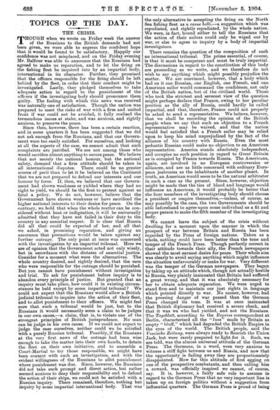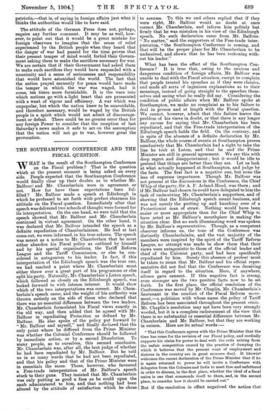T.Id..E; CRISIS.
Since then, however, there has been a certain reaction, and in some quarters it has been suggested that we did not ask enough from the Russians, and that our Govern- ment were too easily satisfied. For ourselves, and looking at all the aspects of the case, we cannot admit that such .complaints are justified. We are not among those who would sacrifice almost anything to secure peace. We believe that not. merely the national honour, but the national safety, demand that a firm attitude should be taken in all international disputes. There could be no greater source of peril than to let it be believed on the Continent that we are not prepared to defend our interests and our honour by force. if, then, we believed that our Govern- ment had shown weakness or yielded where they had no right to yield, we should be the first to protest against so fatal a policy. We do not, however, believe that the Government have shown weakness or have sacrificed the higher national interests to their desire for peace. On the contrary, we hold that when the whole matter can be con- sidered without heat or indignation, it will be universally admitted that they have not failed in their duty to the country in any essential respect. It is clear that Russia did all that could be expected of her, and all that we asked, in promising reparation, and giving an assurance that precautions would be taken against any further outrage. The only point at issue was concerned with the investigation by an impartial tribunal. Here we are of opinion that the Government acted not only wisely, but in accordance with the dictates of essential justice. Consider for a moment what were the alternatives. The whole country desired, and rightly desired, that the men who were responsible for the outrage should be punished. But you cannot have punishment without investigation and trial. To ask for punishment before inquiry is to abandon every principle of justice. But granted that an inquiry must take place, how could it in existing circum- stances be held except by some impartial tribunal ? We could not expect that the Russians would allow a British judicial tribunal to inquire into the action of their fleet, and to allot punishment to their officers. We might feel sure that such a tribunal would be just, but to the Russians it would necessarily seem a claim to be judges in our own cause,—a claim, that is, to violate one of the strongest principles of British jurisprudence. No man can be judge in his own cause. If we could not expect to judge the case ourselves, neither could we be satisfied with a purely Russian tribunal. Possibly, if the Russians at the very first news of the outrage had been wise enough to take the matter into their own hands, to detain the fleet on their own initiative, and to assemble a Court-Martial to try those responsible, we might have been content with such an investigation, and with the evident willingness of the Russians to allot punishment where punishment was due. Since, however, the Russians did not take such prompt and direct action, but rather seemed anxious to deny their responsibility and to defend the action of their ships, we could not be satisfied with a Russian inquiry. There remained, therefore, nothing but inquiry by some impartial international body. That was the only alternative to accepting the firing on the North Sea fishing fleet as a mow belli,=-a suggestion which Was repudiated, and rightly repudiated, by the whole nation. We were, in fact, bound either to tell the Russians that the action of their sailors could only be wiped out by war, or else to agree to inquiry by a body of impartial investigators.
There remains the question of the composition of such an international tribunal. The prime essential, of course, is that it must be competent and must be truly impartial. The discussions in regard to the constitution of this body are proceeding as we write, and we therefore do not wish to say anything which might possibly prejudice the matter. We are convinced, however, that a body which had on it one Russian, one English, one French, and one American sailor would command the confidence, not only of the British nation, but of the civilised world. Those who took the strictest and severest view of the question might perhaps declare that France, owing to her peculiar position as the ally of Russia, could hardly be called impartial, and that, therefore, France could not properly be asked to send a representative. We believe, however, that we shall be recording the opinion of the British people when we say that such an objection to a French representative may be waived, and that the nation would feel satisfied that a French sailor may be relied upon to keep his mind unprejudiced by the fact of the alliance of his country with Russia. Even the most pedantic Russian could make no objection to an American representative. America stands absolutely independent, and occupies no such position in regard to Great Britain as is occupied by France towards Russia. The Americans, again, are involved in no European controversies or alliances, and are as little concerned with ordinary Euro- pean jealousies as the inhabitants of another planet. In truth, an American would seem to be the natural arbitrator in such a case as the present. Since, however, objection might be made that the ties of blood and language would influence an American, it would probably be better that the four members of the investigating body should choose a president or umpire themselves,—unless, of course, as may possibly be the case, the two Governments should be able beforehand to agree upon some individual as a fit and proper person to make the fifth member of the investigating body.
We cannot leave the subject of the crisis without dwelling for a moment upon the manner in which the prospect of war between Britain and Russia has been regarded by the Press of foreign nations. Taken as a whole, nothing could have been better than the tone and temper of the French Press. Though perfectly correct in their attitude towards their ally, the French newspapers showed the most earnest desire for peace. Their whole aim was clearly to avoid saying anything which might influence the situation unfavourably or make for war. Very different was the temper of the German newspapers. They began by taking up an attitude which, though not actually hostile to Russia, very plainly insinuated that Britain had suffered a great wrong, and that it was absolutely necessary for her to obtain adequate reparation. We were urged to stand firm and to maintain our just rights in language which pointed directly to war. No sooner, however, had the pressing danger of war passed than the German Press changed its tone. It was at once insinuated that British diplomacy had received a severe check, and that it was we who had yielded, and not the Russians. The Tageblatt, according to the Express correspondent at Berlin, characterised all the "fuss" made by Britain as empty "bluff," which had degraded the British Empire in the eyes of the world. The British people, said the Vossisehe Zeitung, were always ready to flourish the Union Jack, but were rarely prepared to fight for it. Such, we are told, was the almost universal attitude of the German Press. The Germans, in a word, were very anxious to witness a stiff fight between us and Russia, and now that the opportunity is fading away they are proportionately disappointed. How far this attitude of first egging on one of the prospective combatants, and then calling him a coward, was officially inspired we cannot, of course, say. It is, however, a fairly safe rule to assume in regard to the German Press that no very important line is taken up on foreign politics without a suggestion from influential quarters. The German Press is proud of being The attitude of the German Press does not, perhaps, require any further comment. It may be as well, how- ever, to point out that it would be a great mistake for foreign observers to imagine that the sense of relief experienced by the British people when they heard that the danger of war had. passed for the time proves that their present temper of mind would forbid their Govern- ment asking them to make the sacrifices necessary for war. We are certain that if their Government had asked them to make such sacrifices they would have responded with a unanimity and. a sense of seriousness and responsibility that would have astonished the world. The fact that the nation prayed earnestly for peace would have made the temper in which the war was waged, had it come, ten times more formidable. It is the wars into which nations go with a light heart that are prosecuted with a want of vigour and efficiency. A war which was unpopular, but which the nation knew to be unavoidable, and therefore necessary, would be waged by the British people in a spirit which would not admit of discourage- ment or defeat. There could be no greater error than for any foreign Power to consider that the reception of last Saturday's news makes it safe to act on the assumption that the nation will not go to war, however great the provocation.
THE SOUTHAMPTON CONFERENCE AND THE FISCAL QUESTION.



























































 Previous page
Previous page